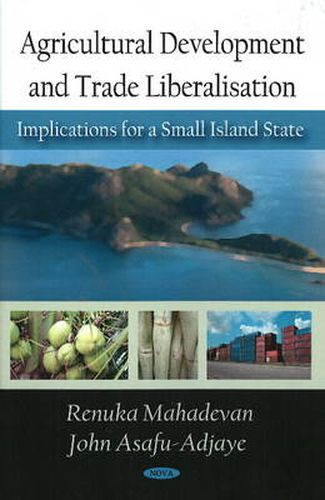Readings Newsletter
Become a Readings Member to make your shopping experience even easier.
Sign in or sign up for free!
You’re not far away from qualifying for FREE standard shipping within Australia
You’ve qualified for FREE standard shipping within Australia
The cart is loading…






This book brings empirical analysis to bear on the policy debate on the economic and environmental impacts of agricultural trade liberalisation on a small developing country, represented by the island of Fiji. It is timely because many African, Caribbean and Pacific (ACP) countries are faced with challenges in the years ahead as a result of globalisation and liberalisation of world trade. Some ACP countries, including Fiji, have already signed an interim Economic Partnership Agreement (EPA) with the European Union to replace the Cotonou Agreement. Other future changes in the trading regime are likely to come from the eventual conclusion of the Doha Round. What is lacking in the current debate is solid empirical analysis to investigate the impacts of these policy changes. What little analysis has been carried out lumps developing countries into regional aggregates. Thus, it may be argued that these studies do not take account of the individual countries’ circumstances. The book focuses on the sugar industry to discuss the broad topic of agricultural reform. Quantitative and qualitative methods are used to support the analysis and discussion in the areas of structural reform in the sugar and other industries as well as the effects of trade liberalisation strategies. The empirical investigation is carried out using appropriate econometric techniques and a dynamic computable general equilibrium model. The material is presented in such a way that the non-technical reader will also benefit from the discussion, which has policy making as its focus. It should appeal to a wide readership including policymakers, policy analysts, researchers in industry and the public sector, as well as postgraduate students in various fields such as agriculture and natural resources, international trade, and economic modelling.
$9.00 standard shipping within Australia
FREE standard shipping within Australia for orders over $100.00
Express & International shipping calculated at checkout
This book brings empirical analysis to bear on the policy debate on the economic and environmental impacts of agricultural trade liberalisation on a small developing country, represented by the island of Fiji. It is timely because many African, Caribbean and Pacific (ACP) countries are faced with challenges in the years ahead as a result of globalisation and liberalisation of world trade. Some ACP countries, including Fiji, have already signed an interim Economic Partnership Agreement (EPA) with the European Union to replace the Cotonou Agreement. Other future changes in the trading regime are likely to come from the eventual conclusion of the Doha Round. What is lacking in the current debate is solid empirical analysis to investigate the impacts of these policy changes. What little analysis has been carried out lumps developing countries into regional aggregates. Thus, it may be argued that these studies do not take account of the individual countries’ circumstances. The book focuses on the sugar industry to discuss the broad topic of agricultural reform. Quantitative and qualitative methods are used to support the analysis and discussion in the areas of structural reform in the sugar and other industries as well as the effects of trade liberalisation strategies. The empirical investigation is carried out using appropriate econometric techniques and a dynamic computable general equilibrium model. The material is presented in such a way that the non-technical reader will also benefit from the discussion, which has policy making as its focus. It should appeal to a wide readership including policymakers, policy analysts, researchers in industry and the public sector, as well as postgraduate students in various fields such as agriculture and natural resources, international trade, and economic modelling.